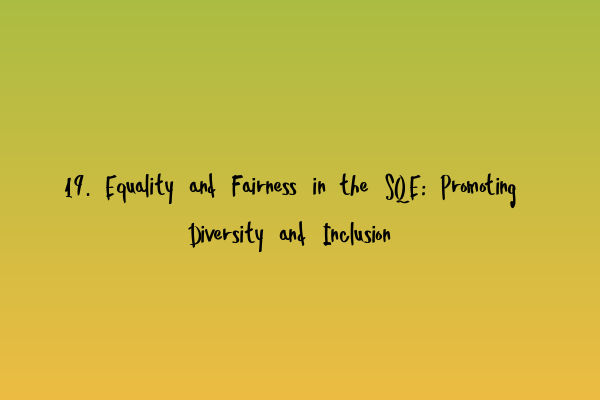As we move forward into a new era of legal education with the introduction of the Solicitors Qualifying Examination (SQE), it is essential that we strive for equality and fairness in the assessment process. Promoting diversity and inclusion in the legal profession is not just a moral imperative, but also a legal requirement under the Equality Act 2010.
The Importance of Equality and Fairness in the SQE
Equality and fairness are the cornerstones of a just and inclusive society. In the context of the SQE, these principles are crucial to ensuring that aspiring solicitors from all backgrounds have equal opportunities to succeed. The SQE should not discriminate against individuals based on their race, gender, disability, age, religion, or any other protected characteristic.
By promoting diversity and inclusion in the SQE, we can ensure that the legal profession reflects the communities it serves. This not only enhances the legitimacy of the legal system but also leads to better decision-making and improved access to justice for all.
Promoting Diversity in the SQE
There are several ways in which the SQE can promote diversity and inclusion. Firstly, the assessment process should be designed to assess the core competencies required for the role of a solicitor, rather than the traditional knowledge-based approach of the previous qualification route.
By focusing on skills and competencies, the SQE can provide a level playing field for candidates from non-traditional backgrounds who may not have had access to the same educational resources as others. This shift in emphasis allows candidates to demonstrate their abilities in a fair and equitable manner, regardless of their educational and socioeconomic background.
Furthermore, the SQE should incorporate measures to address unconscious bias in the assessment process. This can be achieved through the use of anonymized marking and diverse panels of examiners, ensuring that candidates are assessed solely on their merit and not on any preconceived notions or stereotypes.
Ensuring Fairness in the SQE
In addition to promoting diversity, it is vital to ensure fairness in the SQE. This means providing candidates with clear and transparent guidelines on what is expected of them in the assessments and ensuring that the marking scheme is consistent and objective.
The SQE should also provide support and reasonable adjustments for candidates with disabilities or specific learning needs. This may include additional time, accessible materials, or alternative assessment methods, allowing all candidates to demonstrate their abilities on an equal footing.
Conclusion
Equality and fairness are fundamental principles that should underpin the SQE. By promoting diversity and inclusion, we can create a legal profession that truly represents the diverse society we live in and ensure that all individuals have equal opportunities to pursue a successful career in law.
For more information on preparing for the SQE, check out our related articles:
